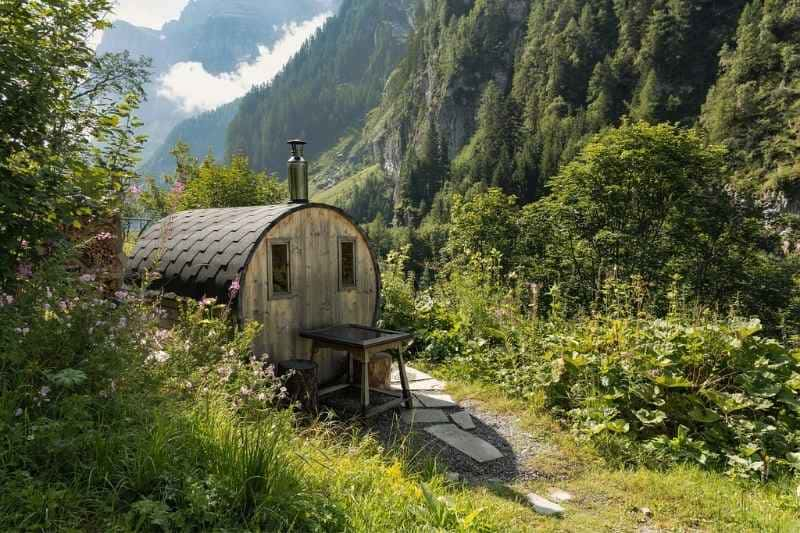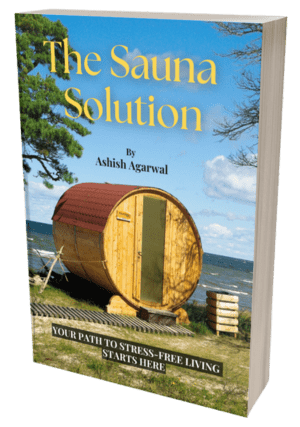9 Different Types of Saunas: Find Your Perfect Match

| “Every sauna has its own soul.” “A person without sauna is like a body without a soul.” “A house without a sauna is not a home.” |
| Finlandia Foundation National |
Wiped out from your daily grind? I get it. Nothing beats stepping into a hot sauna to melt that stress away.
Here’s the thing – saunas aren’t just those wooden rooms with hot rocks anymore. From classic Finnish designs to high-tech infrared boxes, there are different types of saunas for every preference and budget.
Key Takeaways
- Traditional saunas use wood-burning (150-195°F) or electric heaters for authentic dry heat experience with optional steam.
- Infrared saunas provide gentle heating (110-135°F) through light waves, ideal for muscle recovery and those sensitive to high heat.
- Steam rooms and showers offer high humidity (100%) at lower temperatures (110-120°F) for respiratory benefits.
- Hybrid saunas combine traditional and infrared heating (110-195°F), offering versatile wellness options in one unit
- Portable options include infrared blankets and collapsible tents starting at $300, perfect for small spaces and travel.
- Choice depends on space, budget, heat preference, and maintenance commitment – wood-burning needs most upkeep, infrared least
I’ve tried them all. And I’ll tell you exactly what makes each type special. By the time you finish reading this, you’ll know which sauna will give you that perfect “ahh” moment you’re craving.
Let’s turn up the heat and find your ideal sauna match.
Table of Contents
Understanding the 9 Different Types of Saunas
Ever walked into a sauna and felt instant relief? Different types of saunas create this feeling in unique ways.
According to Forbes, whether you prefer a traditional Finnish sauna, a steam sauna, or an infrared sauna, each type offers unique benefits for relaxation and overall well-being.
Whether it’s that rustic appeal of crackling wood or the high-tech allure of infrared rays, you’re after, finding your perfect sauna match is all about getting to know the players in this hot game.
Not familiar with saunas yet? I recommend reading my in-depth explanation of what a sauna is first.
1. Wood-Burning Sauna

Picture this: You step into a cabin-like room. The wood crackles in the stove. Steam rises from hot stones. This is a traditional Finnish sauna experience.
Here’s what makes it special:
- Heats up to 150-195°F
- Uses a metal stove (kiuas) to burn wood
- Creates dry heat with optional steam (löyly)
- Costs between $3600-$15000
I love how the natural wood aroma fills the air. Pour water on those hot stones, and boom – you get an instant steam burst that melts stress away.
But heads up:
- You’ll need space for wood storage
- Regular cleaning is a must
- Proper ventilation is crucial
Want peak relaxation? Visit a Finnish communal sauna. The shared experience of heat, stories, and laughter creates pure magic.
Explore our picks for the Top 5 Wood-Burning Sauna Heaters of 2024 if you are thinking of buying one.
2. Electric Sauna

Image ©sergeyryzhov via Canva.com
Electric saunas are a modern twist to the traditional wood-burning saunas. They were introduced in 1938 by Metos Ltd in Vaasa but electric saunas made a big splash in Finnish homes during the 1950s when electricity became widespread.
You know that feeling when you need a quick stress fix? Electric saunas deliver instant heat therapy with zero prep time.
Technical Specs:
- Temperature range: 150-195°F
- Humidity level: 10-20%
- Heating time: 20-30 minutes
- Investment: $3000-$10000
I installed an electric sauna last year. Here’s what’s awesome about it:
- Press a button, get perfect heat
- Set timers for after-work sessions
- Control temperature like a pro
- No wood chopping needed
But remember:
- Your electric bill will jump
- Requires professional wiring
Trust me – nothing beats walking into a pre-heated sauna after a long day. Just tap the controls, and let waves of warmth melt your stress away.
Explore our picks for the Top 7 Electric Sauna Heaters This Year if you looking to buy one.
Related: Electric vs Wood-Fired Sauna
3. Infrared Sauna
Love the sun’s warmth but hate UV rays? Infrared saunas use light waves to heat your body directly. I switched to infrared last year – total game-changer for my recovery routine.
During my own sessions in an infrared sauna, I noticed a gentle, enveloping warmth that felt deeply relaxing. This type of sauna has been a game-changer for my personal wellness routine, helping me unwind after long days and promoting a sense of rejuvenation.
Related: Our Expert Picks For The Top 11 Infrared Saunas This Year.
Technical Details:
- Temperature: 110-135°F (lower than traditional saunas)
- Cost: $1900-$15000
- Power usage: Low electricity consumption
- Setup: Simple plug-and-play options
What’s Different:
- Direct body heating, not air heating
- Less intense heat sensation
- Perfect for heat-sensitive people
- Used by athletes for weight loss quickly before a competition
My Experience: I’ve noticed deeper muscle relaxation in infrared saunas. The gentle warmth penetrates muscles without the intense heat of traditional saunas. After 30 minutes, I feel refreshed, not drained.
Curious to know more about infrared saunas? Learn the essentials in my detailed article on what is an infrared sauna.

4. Steam Sauna
Having been around since ancient Roman times, steam saunas, often called steam rooms or Turkish baths, sure do have a history as well as some serious relaxation cred!
A steam room is created when a water-filled generator pumps hot steam into an enclosed space, creating moisture in the air. Imagine stepping into a warm cloud. That’s a steam sauna for you. These moisture-rich rooms create a totally different experience from dry heat saunas.
Related: Dry Sauna vs Wet sauna
Tech Specs:
- Temperature: 110-120°F
- Humidity: Nearly 100%
- Setup: Needs steam generator
- Purpose: Deep sweating with gentle heat
Why I Recommend It:
- Perfect for respiratory comfort
- Gives intense skin hydration
- Easier to breathe than dry saunas
- Great for muscle tension
Watch Out For:
- Needs special moisture control
- Regular cleaning required
- Not ideal for breathing issues
- Higher maintenance needs
Pro Tip: I use steam saunas before workouts. The moist heat loosens muscles better than dry heat. Plus, your skin feels amazing afterward.
Related: How to Use Steam Sauna?
5. Smoke Sauna

This is the OG of saunas – no chimney, just pure wood smoke to heat the space. I tried one in Finland last year. Mind-blowing experience. These are a true throwback, taking you right to the roots of sauna history.
Specs:
- Temperature: 150-200°F
- Low humidity level
- Custom-built design
- Traditional wood heating
The Process:
- Wood burns inside, filling room with smoke
- Rocks heat up over several hours
- Fire dies, smoke clears out
- You enter pure, smoke-free warmth
What Makes It Special:
- Softest heat sensation
- Woodsmoke-infused walls
- Authentic Finnish experience
- Deep, penetrating warmth
Experiencing a smoke sauna is like stepping back in time when saunas were central to community life in Finnish culture.
Reality Check:
- Expensive to build
- Needs expert fire management and proper ventilation
- Requires lots of patience
- Daily cleaning needed
The birch branch aroma mixed with heated wood creates something magical. But remember – this isn’t your casual weekend sauna. It’s a ritual that demands respect and know-how.
6. Salt Rooms

Think Himalayan salt cave meets modern wellness tech. These rooms have special machines that blow tiny particles of this magic salt into the air. Salt rooms blend mineral therapy with a controlled climate for breathing benefits.
Technical Details:
- Temperature: 118-167°F
- Humidity: 20-50%
- Cost: $5000-$18000
- Construction: Pure salt walls, floors, ceiling
The Magic:
- Salt particles float in air
- Reach deep into lungs (alveoli)
- Create negative ions
- Glow with ambient lighting
I spent time in a salt room last month. The pink-hued environment feels otherworldly, and the salt-infused air makes breathing feel effortless.
Pro Tip: Best results come from 45-minute sessions. The controlled humidity ensures salt particles reach your airways effectively.
Related: Benefits of salt saunas
7. Steam Showers
These showers are basically humidifying steam generators that heat water until it turns into steam and then release it into the air to spread around your body.
This kind of sauna is usually found in self-contained enclosures at home or sometimes in a fancy gym. Perfect for small spaces and daily wellness routines.
Tech Details:
- Temperature: 110-114°F
- Humidity: 100%
- Installation: Fits in shower space
- Operation: Steam generator system
Key Benefits:
- Space-efficient design
- Simple installation
- Daily relaxation access
- Skin hydration boost
Maintenance Note:
- Regular cleaning needed
- Mold prevention important
- Ventilation required
- Basic upkeep only
My Take: I installed one in my master bath. These units deliver serious relaxation without dedicated sauna space. Perfect for post-workout recovery or evening wind-down.
To know more, read my detailed article on steam shower vs sauna.
8. Portable Home Sauna

Want sauna benefits without permanent installation? Portable saunas bring heat therapy anywhere.
Types Available:
- Infrared blankets
- Collapsible tents
- Pop-up cabins
Related Post: Sauna blanket vs Traditional Sauna
Specs:
- Temperature: Up to 150°F
- Starting price: $300+
- Power: Standard outlet
- Setup time: Minutes
Why I Love These:
- Easy apartment solution
- Travel-friendly design
- Quick heat-up time
- Budget-friendly option
Real Talk: I keep a portable infrared blanket for travel. Perfect for hotel recovery sessions or tight spaces.
Best Uses:
- Post-workout recovery
- Small living spaces
- Travel wellness
- Budget starting point
Related:
>> Best Portable Home Saunas
>> Best Sauna Blankets
9. Hybrid Sauna
Looking for the best of both worlds? Hybrid saunas combine traditional and infrared heating methods in one unit.
Tech Specs:
- Dual heating: 150-195°F traditional, 110-135°F infrared
- Cost: $6000-$17000
- Power: Electric and infrared elements
- Installation: Permanent structure
Why I Love It:
- Switch between heating types
- Use both systems simultaneously
- Perfect for families with different preferences
- Maximizes health benefits
Pro Tip: Start with infrared for muscle warmup, then activate traditional heat for deep sweating. This combination creates the ultimate sauna experience.
Discover how specific sauna environments affect skin parasites in our detailed guide on does sauna kill scabies.
Types of Saunas with Unique Shapes: Beauty Meets Function
Want your sauna to stand out? Traditional Finnish designs offer stunning alternatives to standard boxes.
Barrel Sauna

Picture a giant cedar barrel in your backyard. That’s Finnish engineering at its finest. The round shape isn’t just for looks – it creates perfect heat circulation.
- Cedar construction brings natural aromatherapy
- Temperature sweet spot: 150-195°F
- Investment: $6000-$10000
- Fits naturally in outdoor settings
I’ve used these at mountain retreats. Nothing beats watching sunset from a barrel sauna.
Ready to get your own? Check out our top barrel sauna picks to purchase or follow our step-by-step DIY barrel sauna guide.
Kota Sauna

Think cozy log cabin meets luxury heat room. The octagonal design spreads warmth evenly while creating a gathering space.
- Authentic Finnish design
- Holds 3-14 people
- Price range: $5000-$14000
- Perfect for social sauna sessions
My favorite part? The wood-burning stove creates an unmatched atmosphere.
Related: The Ultimate Guide to Sauna Design
How to Choose the Right Type of Sauna
After exploring countless sauna types and experiencing them firsthand, I’ve learned what really matters when selecting between traditional, infrared, steam, and other varieties. Here’s what you need to consider to find your perfect sauna match.
1. Space and Budget
Each sauna type requires specific space configurations.
- Traditional saunas need proper ventilation and insulation.
- Infrared units fit smaller spaces.
- Steam rooms demand complete moisture barriers.
Your available area and budget narrow down suitable sauna types.
2. Heating Method
The heating method defines your experience.
- Wood-burning creates rustic authenticity but needs attention.
- Electric provides consistent heat with easy controls.
- Infrared offers gentle, targeted warmth.
- Hybrid systems give you both traditional and infrared heating for maximum flexibility.
- Steam delivers humidity and respiratory benefits.
Pick what matches your comfort level.
Related:
Best Sauna Heaters
Calculator for Sauna Heater Size
3. Location
Indoor saunas integrate into daily routines but need ventilation. Outdoor units create dedicated wellness spaces with weather considerations.
Must Read:
The Best Outdoor Saunas
The Best Indoor Saunas
Your climate and lifestyle guide this choice. Indoor units typically see more use, while outdoor ones become special retreats.
Related: Indoor vs Outdoor Sauna

4. Health Goals
Each type serves different wellness needs.
- Traditional high-heat promotes circulation and detoxification.
- Infrared targets joints and muscles.
- Steam supports skin health and breathing.
Match the type to your primary health objectives.
Among the different sauna types, the Dundalk CT Georgian Cabin Sauna is a top-rated choice for those seeking an authentic outdoor traditional sauna experience.
5. Maintenance Requirements
How much hard word you are prepared to put-in for your sauna maintenance is a major factor to consider before you choose your sauna type.
- Wood-burning saunas need regular cleaning and fuel.
- Electric requires basic upkeep.
- Infrared demands simple wipe-downs.
- Steam rooms need constant moisture control.
6. Additional Features
Core function matters most, but thoughtful additions enhance experience. Consider lighting, audio, or aromatherapy options that complement your wellness goals.
Related: Can I wear earbuds in the sauna?
Conclusion
Saunas transform daily wellness. From ancient wood-fired chambers to modern infrared pods, each type writes its own story of healing and relaxation.
Your ideal match awaits:
- Traditional saunas deliver time-tested benefits
- Infrared offers gentle, targeted therapy
- Steam provides respiratory relief
- Hybrid units combine multiple heating methods
- Portable units bring wellness anywhere
- Outdoor installations create natural retreats
I’ve experienced profound benefits across different sauna types. The key? Choose one that fits your space, matches your health goals, and demands maintenance you can handle.
Remember this: The perfect sauna isn’t about the highest price or most features. It’s about finding the type that seamlessly fits your lifestyle and keeps you coming back for more healing sessions. See our complete guide to finding the best sauna for your home.

“Become a Sauna Expert Overnight!”
Grab Your “FREE” Sauna E-book NOW!
Get your hands on the ultimate sauna manual. From history to DIY setups, our free guide has it all.

As a Chartered Accountant turned sauna enthusiast, I bring a unique blend of analytical skills and hands-on experience to the world of heat therapy. With over a decade dedicated to researching and testing sauna products and practices, I’ve developed a deep understanding of this field. A the founder of HomeInDepth.com, I provide reliable, easy-to-understand information on all aspects of saunas. My goal is to guide you through every step of your sauna journey, offering meticulously researched, unbiased advice to help you make informed decisions and create your perfect sauna experience. I’m always happy to hear from sauna lovers like you—feel free to leave questions or share your own tips in the comments below so we can learn together. Contact me on:







35 Comments